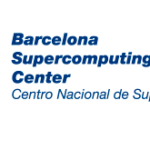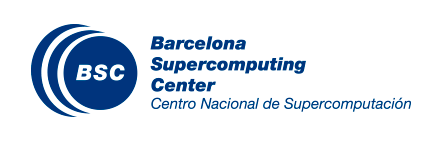
Website Barcelona Supercomputing Center - Centro Nacional de Supercomputación
About BSC
The Barcelona Supercomputing Center – Centro Nacional de Supercomputación (BSC-CNS) is the leading supercomputing center in Spain. It houses MareNostrum, one of the most powerful supercomputers in Europe, was a founding and hosting member of the former European HPC infrastructure PRACE (Partnership for Advanced Computing in Europe), and is now hosting entity for EuroHPC JU, the Joint Undertaking that leads large-scale investments and HPC provision in Europe. The mission of BSC is to research, develop and manage information technologies in order to facilitate scientific progress. BSC combines HPC service provision and R&D into both computer and computational science (life, earth and engineering sciences) under one roof, and currently has over 1000 staff from 60 countries.
Look at the BSC experience:
BSC-CNS YouTube Channel
Let’s stay connected with BSC Folks!
We are particularly interested for this role in the strengths and lived experiences of women and underrepresented groups to help us avoid perpetuating biases and oversights in science and IT research. In instances of equal merit, the incorporation of the under-represented sex will be favoured.
We promote Equity, Diversity and Inclusion, fostering an environment where each and every one of us is appreciated for who we are, regardless of our differences.
If you consider that you do not meet all the requirements, we encourage you to continue applying for the job offer. We value diversity of experiences and skills, and you could bring unique perspectives to our team.
Context And Mission
The Global Health Resilience (GHR) group led by ICREA Research Professor Rachel Lowe at the BSC-CNS is seeking a highly motivated data scientist to co-create robust harmonised datasets and dashboards for decision-support tools to enhance surveillance, preparedness, and response to global health challenges, including climate-sensitive infectious diseases.
The GHR group conducts cutting-edge methodological research on disentangling the impacts of global environmental change on infectious disease risk and co-developing impact-based forecasting models at sub-seasonal to decadal timescales in collaboration with public health, disaster risk management, and humanitarian agencies. The GHR group works closely with the Earth System Services (ESS) group, whose mission is to research the impact of weather, atmospheric chemistry and climate upon socio-economic sectors, including renewable energy, agriculture, water management, forest fires, urban development and health and demonstrate the ongoing value of earth system services to society and the economy.
The selected candidate will conduct data audits and exploratory data reports to summarise characteristics, biases and completeness of both open-source and stakeholder provided data to provide decision-support at multiple spatial scales and different forecasting horizons. They will perform data linkage, involving post-processing, downscaling, integration, harmonization and machine learning techniques, and visualization of multi-source, multi-scale epidemiological, climatic, environmental, demographic, socio-economic, human movement, and health systems datasets. They will develop dashboards to summarise and visualisation multi-sourced data and facilitate communication with the team and stakeholders and prepare and deliver material for stakeholder training and capacity building activities. The successful candidate will work in close collaboration with the Data and Diagnostics team that co-develops the analysis packages. This position presents an opportunity to work alongside a wide range of leading international climate and health scientists delivering cutting-edge climate services for the health sector to inform policymakers in Latin America and the Caribbean, Asia, Europe, and worldwide.
Successful candidates will benefit from expert training and BSC-CNS staff benefits: international multidisciplinary scientific environment and advanced applied research training. We encourage applications from highly motivated candidates with demonstrated experience in impact modelling for public health and an interest in applied research in the context of climate and environmental change.
Key Duties
Co-create decision support systems to enhance public health resilience to climate change
Conduct data audits of existing epidemiological, health system and environmental information
Process, clean, and verify the integrity of data to be used for analysis
Perform Extraction, Transform and Load (ETL) processes
Harmonise multi-source, multi-scale datasets (e.g. health surveillance, demographic, climate, hydrological, socio-economic, mobility, etc.)
Develop automated data pipelines for operational decision support tools
Conduct exploratory statistical analyses and create exploratory data analysis reports
Produce dashboards and design innovative ways to visualise data
Develop training materials for researchers, data managers and stakeholders
Communicate research results at scientific conferences and in refereed journals
Support applications for competitive grants and projects
Support administrative duties of the group, including arranging meetings, taking minutes, writing deliverable and mission reports, maintaining Wiki/webpages, etc.
Engage with local stakeholders, data managers and policy makers
Develop and maintain open-source data and modelling tools, e.g. R packages
Requirements
EducationBSc and MSc in Statistics, Mathematics, Computer Science, Meteorology, Environmental Sciences, Physics, Public Health Geography, Demography, Epidemiology, or equivalent
Essential Knowledge and Professional ExperienceExperience in data management and statistical analyses
Strong programming skills in a suitable language (e.g., R, Python)
Experience with version control systems (e.g., git)
Experience using data visualisation packages, mapping tools and dashboard creation (e.g., Shiny, Tableau, Power BI)
Excellent written and verbal communication skills in English, demonstrated in scientific publications and/or well documented repositories
Ability to work in a collaborative professional environment within a transdisciplinary and international team
Experience with Linux environments and scripting languages (e.g., bash)
Additional Knowledge and Professional ExperienceFluency in English is essential. Proficiency in Spanish and other languages would be advantageous
Experience with machine learning methods and AI
Experience with statistical downscaling and bias adjustments techniques
Experience with various types of data (e.g., epidemiological, meteorological, environmental, mobility, hydrological)
Experience working with climate projections
Experience in the processing and evaluation of satellite/drone images and geodata (e.g., GIS).
Experience with Docker
Experience working with public health stakeholders and international agencies
CompetencesProblem-solving, proactive, result-oriented work attitude
Excellent communication skills
Ability to show initiative, prioritize tasks and meet deadlines
Ability to learn and adapt to multiple programming languages easily
Demonstrates kindness, empathy, and respectful communication in team interactions, fostering collaboration and a positive work environment
Conditions
The position will be located at BSC within the Earth Sciences Department
We offer a full-time contract (37.5h/week), a good working environment, a highly stimulating environment with state-of-the-art infrastructure, flexible working hours, extensive training plan, restaurant tickets, private health insurance, support to the relocation procedures
Duration: Open-ended contract due to technical and scientific activities linked to the project and budget duration
Holidays: 23 paid vacation days plus 24th and 31st of December per our collective agreement
Salary: we offer a competitive salary commensurate with the qualifications and experience of the candidate and according to the cost of living in Barcelona
Starting date: 01/03/2024
Applications procedure and process
All applications must be made through BSC website and contain:
A full CV in English including contact details
A Cover Letter with a statement of interest in English, including two contacts for further references – Applications without this document will not be considered
In accordance with the OTM-R principles, a gender-balanced recruitment panel is formed for every vacancy at the beginning of the process. After reviewing the content of the applications, the panel will start the interviews, with at least one technical and one administrative interview. A profile questionnaire as well as a technical exercise may be required during the process.
The panel will make a final decision and all candidates who had contacts with them will receive a feedback with details on the acceptance or rejection of their profile.
At BSC we are seeking continuous improvement in our recruitment processes, for any suggestions or feedback/complaints about our Recruitment Processes, please contact recruitment@bsc.es.
For more information follow this link
Deadline
The vacancy will remain open until a suitable candidate has been hired. Applications will be regularly reviewed and potential candidates will be contacted.
OTM-R principles for selection processes
BSC-CNS is committed to the principles of the Code of Conduct for the Recruitment of Researchers of the European Commission and the Open, Transparent and Merit-based Recruitment principles (OTM-R). This is applied for any potential candidate in all our processes, for example by creating gender-balanced recruitment panels and recognizing career breaks etc.
BSC-CNS is an equal opportunity employer committed to diversity and inclusion. We are pleased to consider all qualified applicants for employment without regard to race, color, religion, sex, sexual orientation, gender identity, national origin, age, disability or any other basis protected by applicable state or local law.
For more information follow this link
To apply for this job please visit www.bsc.es.



